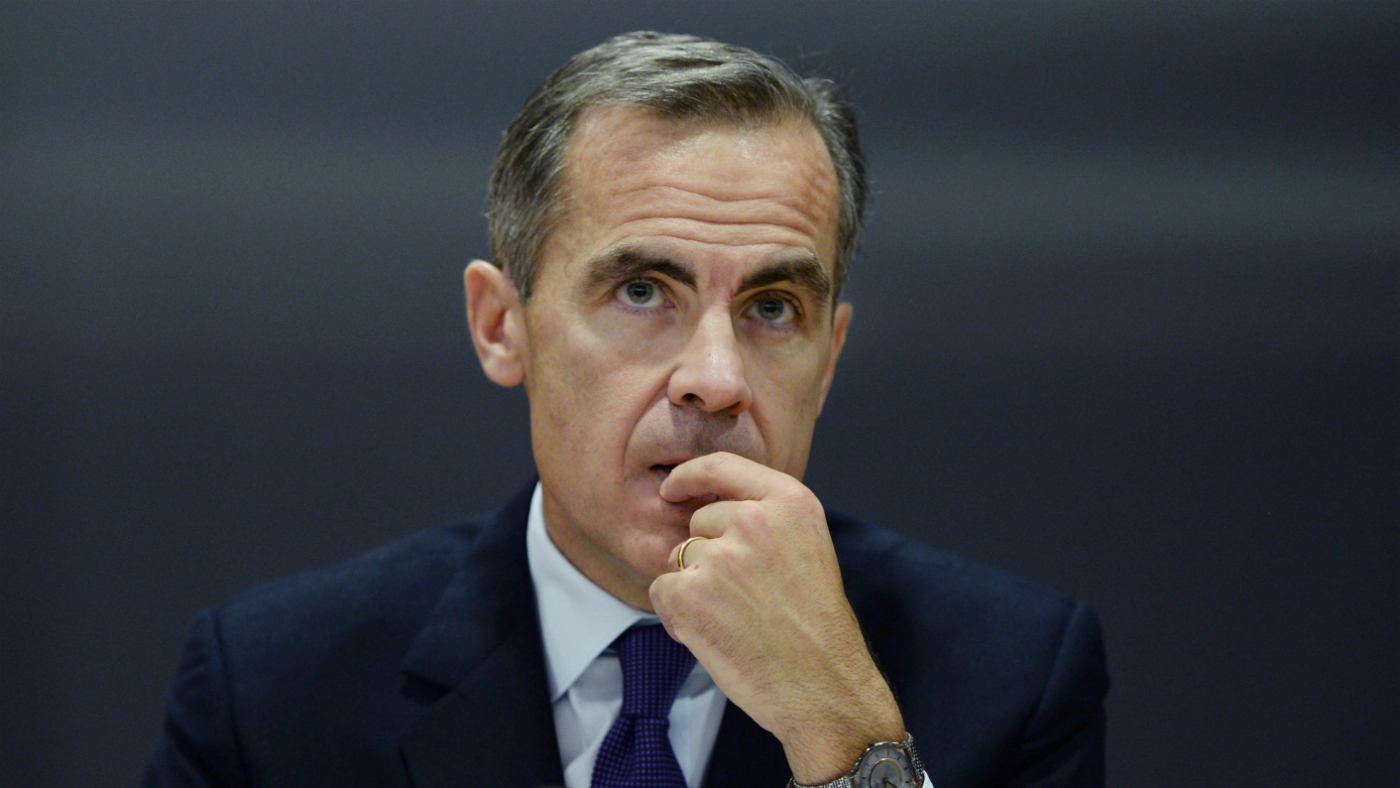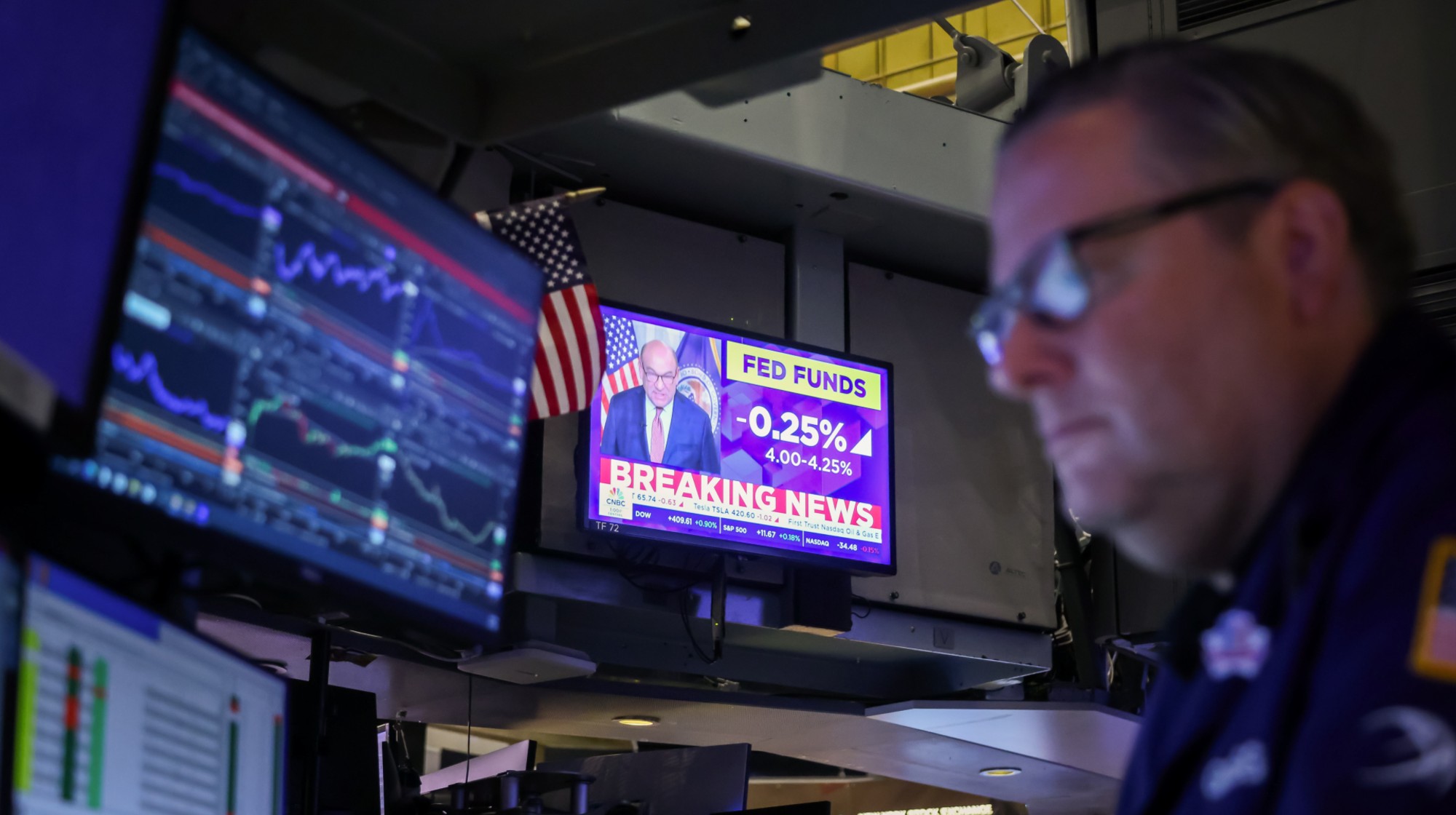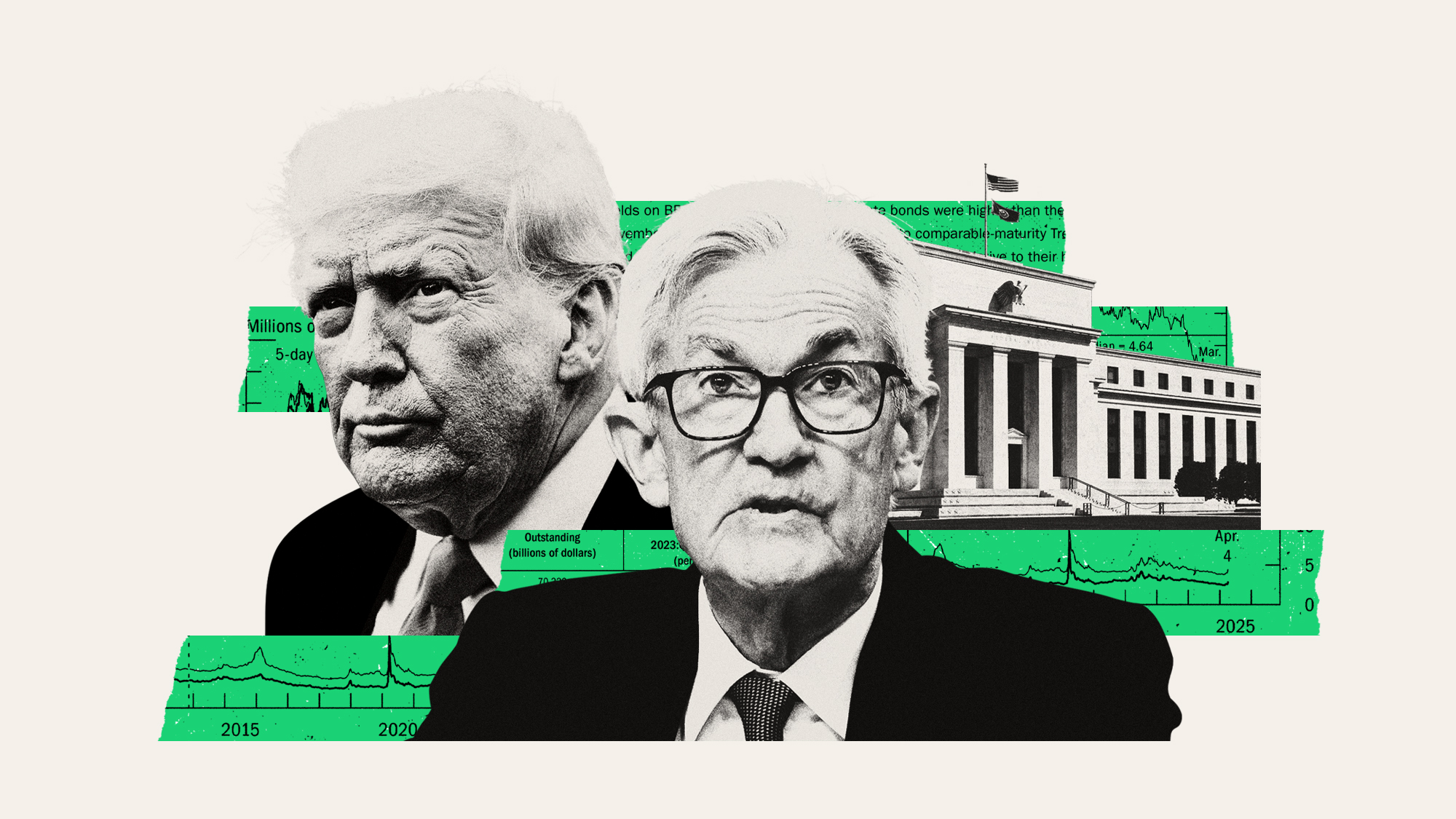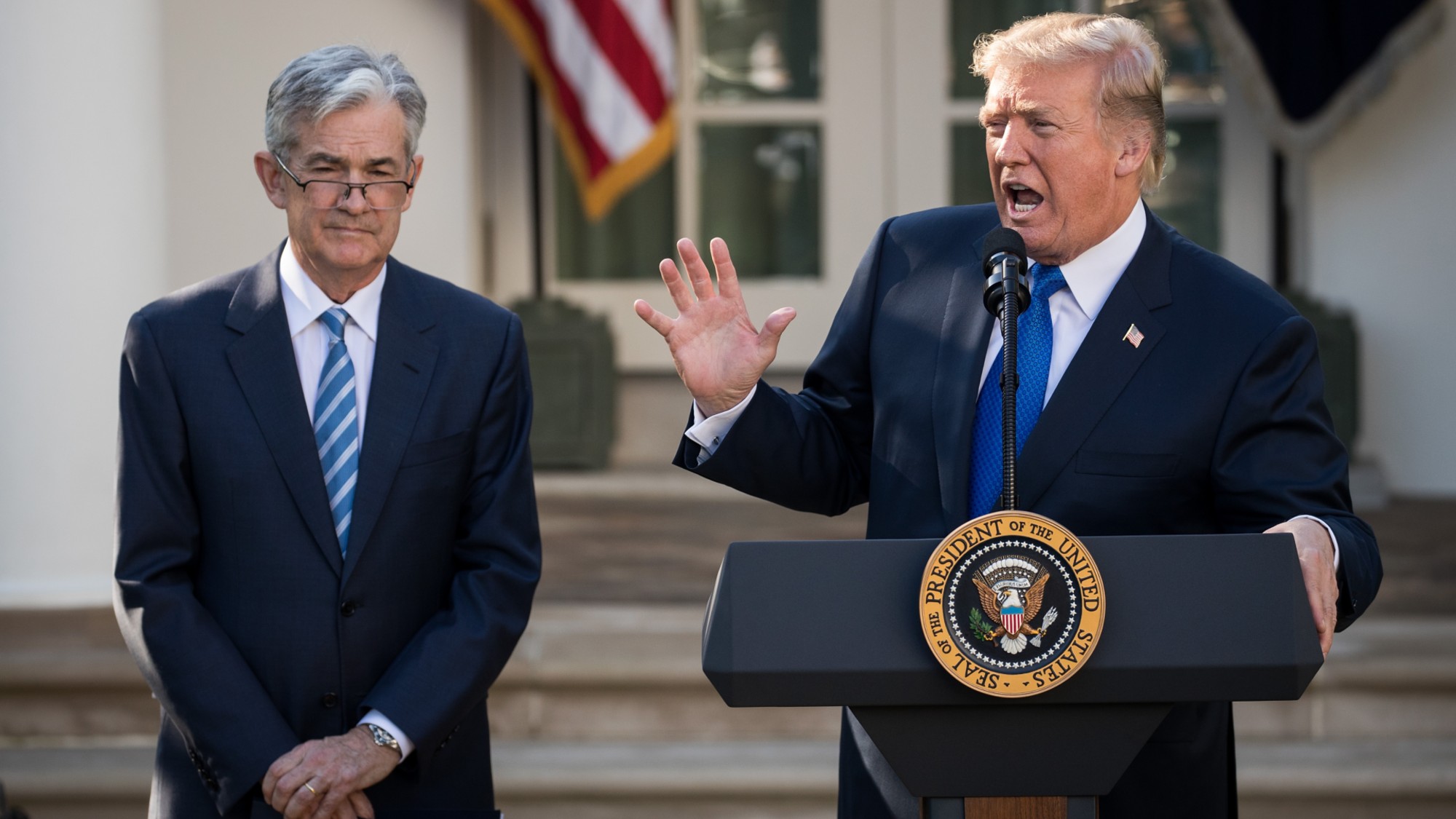Pound plunges after Bank of England's dovish rates signal
Central bank revises its growth forecast for UK economy

A free daily email with the biggest news stories of the day – and the best features from TheWeek.com
You are now subscribed
Your newsletter sign-up was successful
Interest rates: strong wage data adds to case for rise
12 October
Britain's private sector employees are enjoying their fastest real-terms pay growth for 14 years, boosted by the creation of better-paid jobs and flat-lining inflation, according to a respected think-tank.
Figures from the Resolution Foundation show that private sector wages rose by 3.6 per cent above inflation in the three months to August, close to a previous high reached in 2001, reports the Daily Mail. But the statistics also show that average private-sector wages are still £110-a-week below the adjusted pre-crisis peak.
The Week
Escape your echo chamber. Get the facts behind the news, plus analysis from multiple perspectives.

Sign up for The Week's Free Newsletters
From our morning news briefing to a weekly Good News Newsletter, get the best of The Week delivered directly to your inbox.
From our morning news briefing to a weekly Good News Newsletter, get the best of The Week delivered directly to your inbox.
In spite of these caveats – and the fact that government cuts are holding public-sector wage rises at a little more than one per cent – the figures are a welcome boost for the Government, as well as those making a case for interest rates to rise from their six-year record low.
Bank of England governor Mark Carney has consistently said that inflationary pressure resulting from wage rises is likely to require a rates rise, saying this will "come into sharper focus" around the turn of the year. Against this many have pointed to a consistent lack of price rises and an apparent slowdown in China, which could weigh on the economy.
In China itself, officials the country's finance minister has warned the US against a rates hike. Lou Jiwei told The Guardian that the Federal Reserve "can't raise rates" because the US has "global responsibilities" due to the use of the dollar in global financial deals.
This echoes concerns raised by the IMF that an increase in US rates will prompt a credit squeeze in emerging market economies that have built up massive dollar-denominated debt piles during the years of cheap borrowing.
A free daily email with the biggest news stories of the day – and the best features from TheWeek.com
Interest rates prediction: Carney defies markets
09 October
Bank of England governor Mark Carney is sticking to his guns on the timing of an interest rates increase.
Yesterday, the Bank published the minutes of its latest Monetary Policy Committee meeting, which revealed the general view that inflation may remain subdued.
Overall the committee expects price rises to remain below one per cent until the second quarter of next year, with a return to the two per cent target potentially more than two years away.
Markets took this as a sign that rates, which are sometimes seen as a crude counterweight to inflation, will stay lower for longer. The Financial Times says "market participants" are now predicting a first rise in the UK will come in "early 2017".
But Carney continued to sound a more hawkish tone when quizzed on the fringes of the International Monetary Fund and World Bank's annual meetings in Lima, Peru.
He has previously said more than once that the decision on rates would "come into sharper focus" at the end of this year – and he used that language again.
The governor emphasised the decision was based on domestic factors, effectively brushing aside the effects of a slowdown in China, and pointed out that unemployment is low at 5.5 per cent and private sector wages are growing above three per cent.
As for inflation, Carney said the impact of the sharp drop in oil would soon drop out of annual comparisons.
A former MPC member, Andrew Sentence, hinted to BBC Radio Four he would support a move to hike rates sooner.
He said central banks needed to be "courageous" and that it is would be "quite dangerous" to wait until they could see "the whites of the eyes" of inflation, because interest rates could go up "quite sharply" rather than gradually.
The Daily Telegraph says Vicky Redwood, economist at think-tank Capital Economics, wrote that "rates can be left on hold a bit longer than they might have been in the past" and that "a rate rise before the second quarter… seems unlikely".
A rise in the second half of the year is not unthinkable, Redwood said, but sometime between April and June remains the group's "central forecast".
Interest rates: has Bank of England signalled later rise?
8 October
Some economists are predicting that an interest rate rise in the UK will not happen – as had been expected – shortly after the turn of the year because the latest minutes from the Bank of England's Monetary Policy Committee signal ongoing weakness in inflation.
The Financial Times notes the nine-member panel voted by eight-to-one to hold rates at their record low of 0.5 per cent, where they have been held since March 2009.
This had been widely expected and Mark Carney, Bank governor and a member of the committee, has previously indicated a hike would "come into sharper focus" around the turn of the year.
But in the minutes – which, under a new system to encourage market transparency, have been published alongside the decision – the members indicate a general consensus view that inflation will rise slower than expected, which could put off a rates rise.
Price rises are now expected to be below one per cent until spring 2016, while a return to the two per cent target may not happen in the next two years.
The discussion also noted improvements in productivity in recent months, which is limiting any upwards pressure on labour unit costs – the cost to companies for each hour of output – and also acting as a drag on inflation.
Rate-setters are, however, "sanguine" on the UK economy, which is likely to meet forecasts of 0.6 per cent expansion in the third quarter, says the FT.
It should also withstand a slowdown in China, with the BBC saying there is little evidence of problems "having much impact on advanced economies". This, some have suggested, leaves the door open for a rates hike on the timetable already set out: early 2016.
Alan Wilson, analyst at Aberdeen Asset Management, said the MPC decision "marks a return to a more cautious tone" and that "the prospect of a rate rise is some way off".
Howard Archer of IHS Global Insight said "an interest rate hike… sometime in the first half of 2016 still looks much more likely than not".[[{"type":"media","view_mode":"content_original","fid":"85230","attributes":{"class":"media-image"}}]]
Interest rates: why IMF report could accelerate a rise
7 October
The International Monetary Fund issued another downbeat forecast on global economic growth yesterday, replete with a warning about the effects of an interest rate rise.
But the fund's latest report also gives a cautious endorsement of the economic plans set out by the UK government, predicting an increase in expansion this year and modest fall back next. It agrees a marginal budget surplus will be achieved by 2019, and most notably acknowledges that interest rates will soon rise.
The Financial Times reports that Maurice Obstfeld, the new IMF chief economist, said "the time was drawing closer when the Bank of England could begin to raise interest rates from their current 0.5 per cent low". The fund actually upgraded the UK growth forecast this year to 2.5 per cent, making it one of the fastest-growing advanced economies. "Continued steady growth is expected," it said, "supported by lower oil prices and continued recovery in wage growth".
Debates on a rate rise have raged in recent weeks, not least because of an apparent slowdown in China's rapid expansion that could have knock-on effects around the world. While the IMF echoed this warning, it kept its growth prediction for China this year steady at 6.8 per cent.
This is lower than Beijing's estimate, but the lack of a downward revision has offered some confidence that there will not be a "hard landing". In any case, Bank of England governor Mark Carney has said he does not believe events in China will dictate UK economic performance unless there is an exceptional crash.
The BBC notes that the IMF has lowered the forecast for total global growth from 3.3 per cent to 3.1 per cent this year, citing in particular emerging economies such as Brazil, Nigeria, South Africa and Russia.
Falling commodity prices are identified as a key driver of the downgrades. Risks could be exacerbated by a rise in rates in the US, which would increase the value of the stockpiles of dollar-denominated debt built up in recent years while borrowing costs have remained extraordinarily low.
Interest rates: can the UK economy take a rates rise?
2 October
It's becoming the defining economic question of the post-crisis era: when will the life support machine of ultra-low interest rates be switched off?
Most economists – at least those with a vote on central bank committees – have until now maintained that the economy isn't able to cope with higher rates, which could reduce demand and stifle the UK's fragile recovery. Companies might struggle and this would have a knock-on effect on jobs. In terms of personal finance, a rates increase would be bad news for many mortgage borrowers who would feel the pinch.
Then there are the 'hawks' calling for a rise, who cite falling unemployment as a sign that inflationary pressure might be building up in the background. In any case, they add, the markets are being distorted by rates being too low for too long, and this reduces incentives to save and forces people and businesses to take on more risk in the hunt for returns.
Commentators have been watching out for statistical signs that would either bolster confidence that a rates rise was on the cards or definitively kick the issue into the long grass. A flurry of economic data published on Thursday has something for those on both sides of the divide.
The Financial Times notes that figures from the Office for National Statistics have revealed that productivity – that is, the output per hour by companies after costs – rose at the fastest rate for four years in the second quarter and passed its pre-recession peak. We're still well behind some of our peers, but the news is encouraging and suggests that productivity is "capable of returning to its pre-crisis growth rates".
The figures also show a rise in labour costs – the amount of money companies have to spend to achieve output – of 2.2 per cent. This is far higher than expected and above the Bank of England's inflation target, an early sign that maybe, finally, inflationary pressure is beginning to build.
On the other hand, industry figures show that the manufacturing sector is seeing waning expansion and actually recorded a net fall in jobs last month for the first time in more than two years, according to the BBC.
Among the issues blamed for the slowdown was the continuing deceleration in China, which is becoming more and more critical to the assessment of when it might be safe to increase rates.
Overall the picture remains as unclear as ever. Bank of England governor Mark Carney has asserted a number of times that he feels China's fall from grace will not affect the UK profoundly and that a rates rise is expected some time early next year. But we'll have a lot more data to wade through to assess the likely impact between now and then.
-
 Health insurance: Premiums soar as ACA subsidies end
Health insurance: Premiums soar as ACA subsidies endFeature 1.4 million people have dropped coverage
-
 Anthropic: AI triggers the ‘SaaSpocalypse’
Anthropic: AI triggers the ‘SaaSpocalypse’Feature A grim reaper for software services?
-
 NIH director Bhattacharya tapped as acting CDC head
NIH director Bhattacharya tapped as acting CDC headSpeed Read Jay Bhattacharya, a critic of the CDC’s Covid-19 response, will now lead the Centers for Disease Control and Prevention
-
 Powell: The Fed’s last hope?
Powell: The Fed’s last hope?Feature Federal Reserve Chairman Jerome Powell fights back against President Trump's claims
-
 The end for central bank independence?
The end for central bank independence?The Explainer Trump’s war on the US Federal Reserve comes at a moment of global weakening in central bank authority
-
 Who will be the next Fed chair?
Who will be the next Fed chair?Today's Big Question Kevin Hassett appears to be Trump’s pick
-
 Should Labour break manifesto pledge and raise taxes?
Should Labour break manifesto pledge and raise taxes?Today's Big Question There are ‘powerful’ fiscal arguments for an income tax rise but it could mean ‘game over’ for the government
-
 What are stablecoins, and why is the government so interested in them?
What are stablecoins, and why is the government so interested in them?The Explainer With the government backing calls for the regulation of certain cryptocurrencies, are stablecoins the future?
-
 Fed cuts interest rates a quarter point
Fed cuts interest rates a quarter pointSpeed Read ‘The cut suggests a broader shift toward concern about cracks forming in the job market’
-
 Trump's threats to fire Jerome Powell are unsettling the markets
Trump's threats to fire Jerome Powell are unsettling the marketsTalking Points Expect a 'period of volatility' if he follows through
-
 How will Wall Street react to the Trump-Powell showdown?
How will Wall Street react to the Trump-Powell showdown?Today's Big Question 'Market turmoil' seems likely